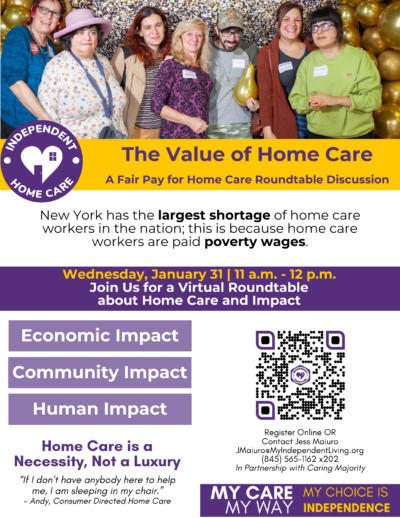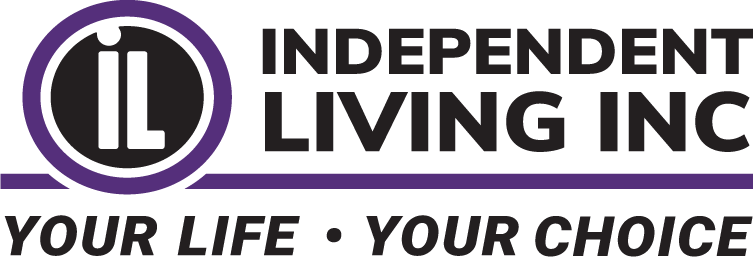
Register to listen to the roundtable discussion and submit Q&A using the registration link provided. If you are interested in becoming a panelist / discussion leader, please contact Jess Maiuro, Marketing Assistant, at (845) 565-1162 x202 or JMaiuro@MyIndependentLiving.org
SPEAKERS
- Consumer
- Personal Assistant
- Designated Representative (Family Member)
- Person who uses an Assisted Living Facility
- Caring Majority Rising
- Fiscal Intermediary
- Disability Rights Advocate
- Legislator(s)
The Value of Home Care
A Fair Pay for Home Care Roundtable Discussion
Join us for a virtual roundtable discussion about Home Care and Impact: Economic Impact, Community Impact, and Human Impact
“Home Care is a necessity, not a luxury. If I don’t have anybody here to help me, I am sleeping in my chair.” – Andy, Consumer Directed Home Care Consumer
In response to the critical challenges facing the home care sector in New York, a diverse group of stakeholders will convene for a panel discussion titled “The Value of Home Care: A Fair Pay for Home Care Discussion.” The event aims to shed light on the pressing issues surrounding home care, particularly the proposed budget for Consumer-Directed the Personal Assistance Program (CDPAP) and its workers, outlined in Governor Kathy Hochul’s 2024-2025 Executive Budget Proposal.
Event Details:
Date and Time: January 31, 2024 | 11 a.m. – 12 p.m.
Location: Zoom
Panel Host: Independent Home Care, Inc. with Caring Majority Rising
Participants: Home care professionals, consumers, families, fiscal intermediaries, legislators, and other key stakeholders
Key Discussion Points:
- Impact on Caregiver Livelihood
- Quality of Care
- Choice and Independence
- Workforce Shortage Concerns
- Financial Strain on Families
- Community Integration
- Potential Alternatives to Wage Parity Cuts
- Fiscal Intermediary Perspective
- Legislative Support for Fair Pay
- Collaborative Solutions
Discussion Details
Impact on Caregiver Livelihood: Highlighting the direct consequences of proposed wage parity cuts on CDPAP home care workers’ livelihoods, emphasizing the crucial role they play in supporting individuals with disabilities and older adults. Addressing the need for increased wages for home care workers across the board.
Quality of Care: Emphasizing the link between fair wages for caregivers and the quality of care provided to home care consumers, sharing anecdotes that illustrate the positive impact of dedicated caregivers.
Choice and Independence: Discussing how proposed changes threaten the right to choice for individuals in selecting their caregivers and the importance of maintaining independence.
Workforce Shortage Concerns: Addressing the existing home care worker shortage and how proposed wage cuts could exacerbate the issue, with a call for a fundamental shift in the perception of home care.
Financial Strain on Families: Sharing insights into the financial strain families experience, exploring challenges in affording necessary care and broader economic implications.
Community Integration: Stressing the role of home care services in facilitating community integration for individuals with disabilities and how disruptions can impact community participation and supporting one’s right to the Most Integrated Setting (Olmstead Act). Governor Hochul’s plan to issue a New York State Olmstead Plan in 2024.
Potential Alternatives to Wage Parity Cuts: Advocating for exploring alternative long term solutions to control Medicaid spending without resorting to wage parity cuts, actually increasing rates of pay, highlighting legislative proposals or policy changes.
Fiscal Intermediary Perspective: Bringing in the perspective of fiscal intermediaries and their role in supporting the administration of home care services.
Legislative Support for Fair Pay: Encouraging legislators to consider the broader implications of proposed changes and advocating for fair pay for home care workers. Currently, one legislator is committed to attend.
Collaborative Solutions: Emphasizing the need for collaboration among caregivers, consumers, families, fiscal intermediaries, and legislators to find sustainable and equitable solutions.

